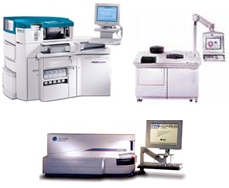Immunoassay methods are now widely used in significant areas of pharmaceutical analysis including diagnosis of diseases and in therapeutic drug monitoring. It is crucial that the immunoassay analyzers used in clinical settings and laboratories should meet certain performance standards.
With the increase in demand for quality analyzers, reputable manufacturers offer advanced systems with superior capabilities. Modern portable and bench-top analyzers can conduct several tests per hour, thus meeting the demands of large volume testing laboratories. They also come with advanced, user-friendly features such as touchscreen interface, easy-to-use software and ready-to-use reagents. With advanced analyzers, laboratories can benefit from easy and trouble free operation, workflow flexibility, fast turnaround times, and broad measuring ranges. Immunoassay analyzers use random sampling and continuous access sampling to process samples. Here are a few popular models in the market today:
- Beckman Coulter Access II - A convenient bench-top instrument, this analyzer offers greater control over quality, reliability and speed without sacrificing valuable floor space. One of the smallest bench-top analyzers in its class, it can run up to 100 tests per hour.
- Siemens ADVIA Centaur - Blending perceptive design and advanced capabilities, the system is designed to meet the growing needs of today's hospitals and clinical laboratories. The device offers the highest productive rate of up to 240 tests per hour with the least hands-on time.
- Siemens DPC Immulite 2000 - Designed specifically for optimum efficiency and consolidation in medium- and high-volume laboratories, this analyzer comes with a processing throughput of 200 tests per hour.
While choosing an immunoassay analyzer, lab professionals must consider certain factors such as the number of samples and tests per hour, types of tests and reagents needed, whether automatic repeat and dilution are required, and whether it is compatible with tests from other instruments. Technical issues such as precision, accuracy, sensitivity and dynamic range should also be considered. Quality immunoassay reagents should be used to ensure accurate results.
The best way to purchase the right immunoassay analyzer for your lab is to find a reliable lab equipment supplier. An experienced vendor can provide professional guidance to help you choose the right model and would also provide excellent maintenance support. Online dealers offer high quality devices at great prices and budget-friendly options such as recertified equipment, reagent rental plans, and leasing.



